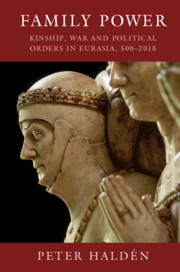Book contents
- Family Power
- Family Power
- Copyright page
- Contents
- Preface and Acknowledgements
- Chronology
- 1 Introduction
- 2 How Social Science Separated Families from Political Order
- 3 Formless Kinship in Formless Polities
- 4 Consolidating Dynasties and Realms
- 5 Strong Aristocracies in Strong States
- 6 The Revival and Sudden Death of Political Kinship
- 7 The Arab Empires c.632–c.900
- 8 Sacred Yet Supple
- 9 The Ubiquitous and Opaque Elites of the Ottoman Empire c.1300–c.1830
- 10 Clans and Dynasties in the Modern Middle East
- 11 Conclusions
- Bibliography
- Index
11 - Conclusions
Implications for State Theory, Power and Modernity
Published online by Cambridge University Press: 09 March 2020
- Family Power
- Family Power
- Copyright page
- Contents
- Preface and Acknowledgements
- Chronology
- 1 Introduction
- 2 How Social Science Separated Families from Political Order
- 3 Formless Kinship in Formless Polities
- 4 Consolidating Dynasties and Realms
- 5 Strong Aristocracies in Strong States
- 6 The Revival and Sudden Death of Political Kinship
- 7 The Arab Empires c.632–c.900
- 8 Sacred Yet Supple
- 9 The Ubiquitous and Opaque Elites of the Ottoman Empire c.1300–c.1830
- 10 Clans and Dynasties in the Modern Middle East
- 11 Conclusions
- Bibliography
- Index
Summary
This chapter summarizes the book and advances a synthetic theory on the development and maintenance of political orders. It argues that theories of political order in general and the state in particular have been one-sided in their emphasis on coercive power and the monopoly of violence. This books shows that coercion and violence must be complemented by consent, co-operation and integration as preconditions of stability in order to create more comprehensive social science theories of political order. Concerning modernity, there was no single path to the secular and egalitarian societies that developed in the West during the twentieth century. We could have ended up with societies that were administratively and technically modern but not egalitarian and democratic. Thereby the book problematizes the idea that premodern and modern forms of political orders are the timeless concepts claimed by modernization theory.
Keywords
- Type
- Chapter
- Information
- Family PowerKinship, War and Political Orders in Eurasia, 500–2018, pp. 310 - 326Publisher: Cambridge University PressPrint publication year: 2020

